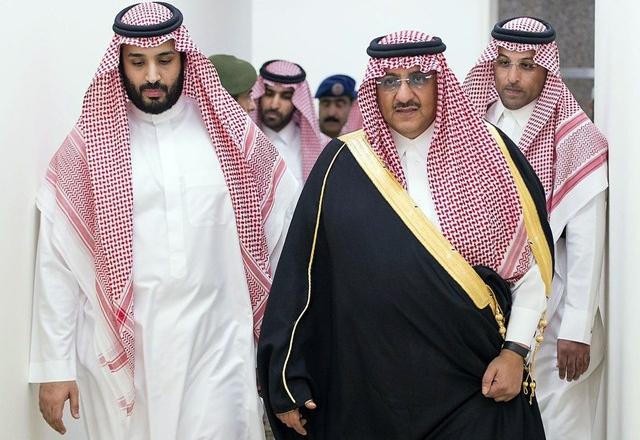You are here
‘Trump factor’ seen in naming of new Saudi crown prince
By AFP - Jun 23,2017 - Last updated at Jun 23,2017
RIYADH — Closer ties between Saudi Arabia and US President Donald Trump’s administration helped pave the way for a succession shake-up making a 31-year-old prince the kingdom’s de facto ruler, analysts say.
On Wednesday King Salman, 81, named his son Mohammad Bin Salman crown prince and heir to the throne after firing Mohammad Bin Nayef, whose counter terrorism expertise had made him a favourite of previous American administrations.
Over the past two years Mohammad Bin Salman accumulated vast powers at the expense of Mohammad Bin Nayef, 57, a veteran law enforcer who served as both crown prince and interior minister.
Mohammad Bin Salman chipped away at his authority but Mohammad Bin Nayef’s popularity with the previous US administration of Barack Obama had prevented his ouster, said Stephane Lacroix, associate professor at Sciences Po university in Paris.
“This all changed when Trump came to power,” he said.
After assuming office in January, Trump made it clear that his Middle East partners are Mohammad Bin Salman, Abu Dhabi crown prince Sheikh Mohammad Bin Zayed Al Nahyan and Egyptian president Abdel Fattah Al Sisi, Lacroix said.
Riyadh welcomed Trump’s more aggressive attitude towards its rival Iran, which Saudi Arabia accuses of interference throughout the region.
Mohammad Bin Salman was an early visitor to Washington, where he met Trump in March before the president last month made the first overseas trip of his presidency to Saudi Arabia.
Trump received a royal welcome from Mohammad Bin Salman and others.
In a speech, the president urged Muslim leaders assembled in Riyadh from around the world to “drive out” extremists and “terrorists”.
He singled out Iran as a culprit.
Trump’s approach emboldened Mohammad Bin Salman and the Abu Dhabi crown prince who seized the chance this month to cut ties with their Gulf neighbour Qatar, analysts and diplomats said.
They accused Doha of supporting groups, including some backed by Iran, “that aim to destabilise the region”.
Trump has made statements siding with Saudi Arabia on the Qatar crisis.
‘Deep instability’
With his Trump connection established, Mohammad Bin Salman “knew that the US wouldn’t mind him sidelining MBN,” Lacroix said, referring to the ex-crown prince by his initials.
“I think the Trump factor matters tremendously,” he said.
On Wednesday Trump telephoned the new Saudi crown prince to congratulate him on his appointment.
Frederic Wehrey, of the Middle East Programme at Washington’s Carnegie Endowment for International Peace, said “a lot of signalling” from Washington — including a more activist regional foreign policy — influenced the appointment of Mohammad Bin Salman as crown prince.
“I think that matters,” Wehrey said.
The Saudis were not “waiting for a nod from the [United] States” but the warming of relations played a role alongside domestic Saudi factors, he said.
By making Mohammad Bin Salman “de facto ruler” heading the kingdom’s most important portfolios, King Salman created “a solid foundation” for his son’s policies, said Andreas Krieg of the Defence Studies Department at King’s College London.
It signals to Washington that the kingdom is committed to reform “and is the most important partner for the Trump administration” against both Iran and Daesh group fighters, Krieg said.
His appointment “is purely about demonstrating a degree of certainty in times of uncertainty,” Krieg added.
Mohammad Bin Salman must also have “full support” from Saudi royals as pressure mounts from a series of challenges, he said.
These include the relations with Qatar, a military intervention that has continued for more than two years in Yemen, an economy adjusting to the loss of oil revenue, and attempts at social reform in a deeply conservative Islamic nation.
Lacroix said that among the thousands-strong royal family there does not seem to be much opposition to Mohammad Bin Salman’s appointment, which has concentrated power in one man.
“This is a very new thing... the Saudi regime was always built upon a balance of power between different actors, different factions,” he said.
“This is the most autocratic version of the Saudi regime we’ve seen until now.”
With the Saudi royal succession “a done deal”, the real issue is how to create the best possible working relationship between the White House and the Saudi royals “at a time of really deep instability and trouble” in the Middle East, said Anthony Cordesman of the Centre for Strategic and International Studies in Washington.
Related Articles
JT and agencies AMMAN — Saudi Arabia on Wednesday declared Prince Mohammad Bin Salman as the kingdom’s crown prince while Pri
Saudi Arabia’s King Abdullah appointed his son as governor of Riyadh province on Wednesday in a move that strengthens his branch of the ruling dynasty as it approaches a difficult decision over how to transfer power to the next generation.
Saudi Arabia's King Salman on Wednesday named his powerful interior minister as heir in a major shakeup that also saw the world's longest-serving foreign minister replaced.

















